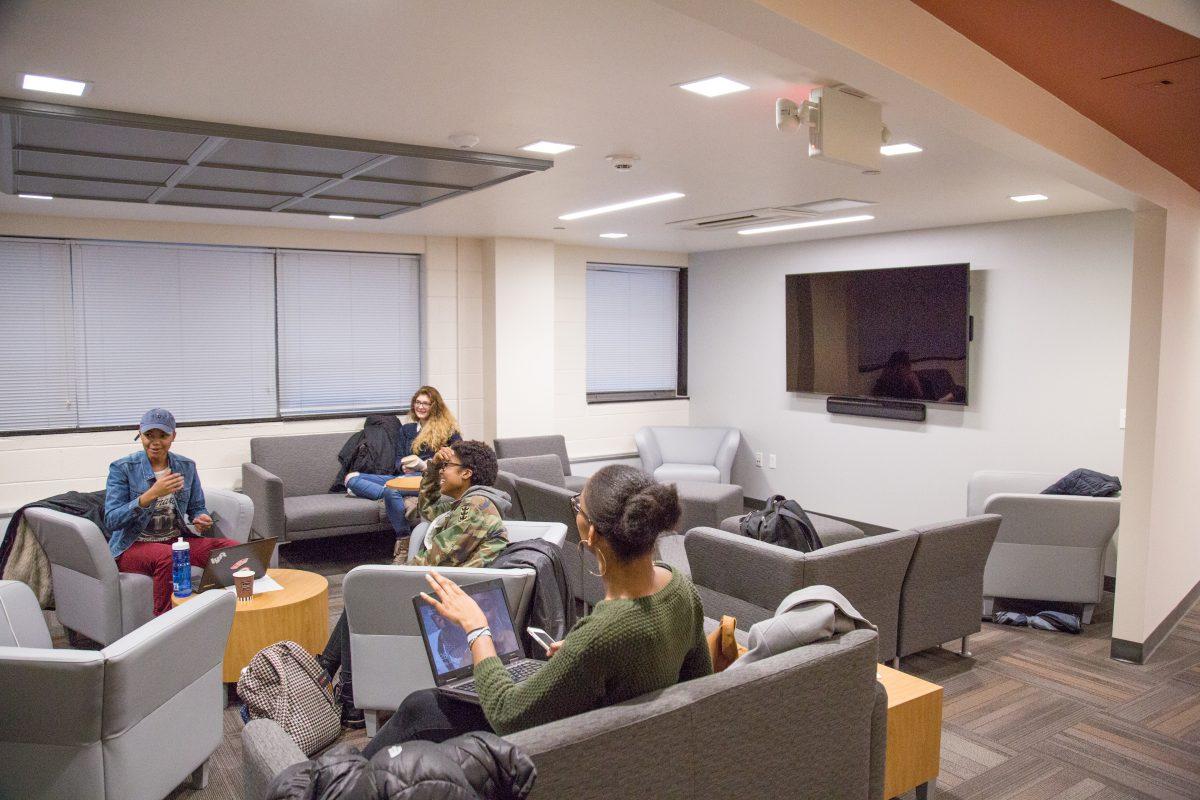Opening the door to difficult conversations about inclusion
The smell of fresh paint and plush gray couches are just a small part of what makes the new Office of Inclusion and Diversity such a positive, and welcoming, addition to the second floor of Campion Student Center. The office’s deluxe renovations and titillating charm—with a study space, kitchenette, and social area—are now easily accessible and offer a space for all students to hit the books or even take a nap. The primary purpose of the center is to function as a safe environment, free from fear of discrimination or exclusivity among peers. Formerly named the Office of Multicultural Life, the new Office of Inclusion and Diversity (OID) emphasizes the importance of inclusion for the entire student body in regards to this new space.
In the September 14th issue of The Hawk in 2016, Cary Anderson, Ph.D., vice president for Student Life and associate provost, discussed the office, emphasizing the purpose of changing titles: “That title, ‘inclusion,’ is an important part of it…[We want] people talking about inclusion and diversity, thinking about it, and understanding that it’s a value of the institution.” By now offering a larger and more accessible office, the OID encourages students to actively visit, provoking thought as to how their actions can promote inclusivity on campus.
In addition, Monica Nixon, Ph.D, assistant provost for Inclusion and Diversity, offers office hours in the new space in an effort to promote accessibility for all students visiting the center. By having a member of the administration present for students with regards to diversity, St. Joe’s has made an important first step in the mission to become more responsive to the needs of the student body.
However, this should not invite nor heed complacency among students, faculty, or staff. As The Hawk staff, we urge the student body to ask the hard questions that challenge us to push beyond the boundaries of our comfort zone. If the university believes that the creation of a space solely for the purpose of fostering inclusion and diversity is necessary, we need to think about why these spaces exist in the first place.
Another essential step towards fully accepting and embracing diversity is considering how we may be making others feel uncomfortable around us. Diversity is an effort to address the many ways in which people are excluded based on race, ethnicity, gender, sexual orientation, physical ability, national origin, or religious affiliation. Some of these characteristics are explicit, others implicit in our behaviors. All organizations on campus should be held to the same high standard of encouraging diversity and acceptance, but it’s possible that students may still feel unwelcome in certain environments. The time has come for St. Joe’s to take a step beyond a physical space for inclusion and think about how we as a campus can work towards doing more. Going forward, we need spaces that have been created on the assumption that they foster diversity and inclusion, simply by default. Our own actions as students and the university at large can prompt action. If nothing else, the administration recognizes that St. Joe’s lacked something that it required.
Currently, some leadership opportunities on campus— APEX leaders, Hawk Hosts, Resident Assistants, and executive board members of the Student Union Board—require diversity training. This diversity training expands upon the basic training that every student at St. Joe’s receives regarding alcoholic substances and sexual encounters. If diversity seems to be an important idea on campus, then maybe there should be mandatory training that exposes all students to diversity and how to create inclusive environments.
We cannot become complacent with the changes around us or lack thereof. If we do, we could potentially become apathetic about diversity, when really, we should embrace it. We have an obligation to get involved in events sponsored by, or include leadership from, OID, so we understand the purpose it serves on campus and the good it brings to St. Joe’s as a community. There needs to be a way to engage the entire student body, and make students more conscious of diversity and its significance on campus, while doing so to avoid indifference amongst the masses. By taking further steps—like instituting a new mandatory diversity training for all St. Joe’s students —awareness could potentially grow even more in our worldviews and mindsets. We must reflect on what exactly is at stake here. It is not the installation of a new campus requirement or an online survey to administer. Rather, it is making all students aware that some individuals, groups, or communities on campus do not feel welcome or safe on a consistent basis.
Colleges function as places where students of different backgrounds and beliefs can coexist and learn from one another. Here at St. Joe’s, we are not exempt from that purpose. As students of a Jesuit university, we are called to further that mission. From the very beginning of our educational journeys—even as children—we seek to belong in a community and find others that love us for who we are. At the end of the day, we all crave inclusion and acceptance from our peers. It is essential to reflect and express empathy unto others and specifically, those who are looking to find community.
What are we doing—passively or actively—that makes people feel left out? When was the last time you heard someone mention that their voice had gone unheard in or outside a classroom? Perhaps someone in your life feels misrepresented or alienated because of their identity. We all want to feel valued and be a part of something greater than ourselves. What kind of university are we if we inhibit any St. Joe’s student from that opportunity? If certain members of our student body are unable to feel the purest kind of joy that comes from the love of a community, we ultimately fail as an institution. Hawk Hill remains in our hearts and offers us a place to call home, but it can only do that if it is truly a home for everyone.
Correction: In the Jan. 25 issue of The Hawk editorial incorrectly stated that Monica Nixon, Ed.D., assistant provost of inclusion and diversity, would have an office in the new Center of Inclusion and Diversity. She will hold office hours in the new space.















































